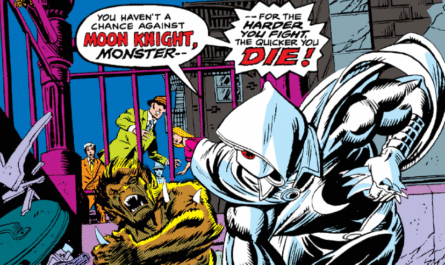Lizzy’s Take:
So I’m new to comics. Like, brand new. I’ve been working my way through Marvel’s history thanks to My Marvelous Year, and most of what I’ve read so far has been fun, chaotic, and occasionally sexist enough to make me roll my eyes clean out of my head. But The Galactus Trilogy? This one hit different.
This isn’t just a big battle—it’s Marvel discovering religion, space gods, and the idea that sometimes, punching harder isn’t going to save the day. The vibes are immaculate. The logic is questionable. And the Silver Surfer is somehow both a himbo and a space philosopher. I think I’m in love?
👉 Recommended if: You want to witness the moment Marvel said “what if God, but vibes?” and meant it.
🚫 Skip it if: You’re allergic to purple, melodrama, or Jack Kirby’s cosmic chaos panels.

What Even Is This?
This three-issue arc runs through Fantastic Four #48–50 and introduces two huge Marvel characters: Galactus, a planet-eating cosmic god in purple thigh-highs, and the Silver Surfer, his glowing chrome messenger on a literal surfboard. (Yes, he surfs through space. I had questions too.)
Plot-wise, it starts with flaming skies over New York, a cosmic warning system courtesy of the Watcher (the bald space voyeur who supposedly doesn’t interfere, but always does). His goal? To hide Earth from Galactus.
Spoiler: it doesn’t work. The Surfer sees right through the illusion and boom—here comes Galactus to do brunch on our planet’s life force.
Let’s Talk Vibes

Each issue cranks the stakes higher. In issue #48, Galactus descends like some intergalactic HOA manager, ready to file a complaint against the entire human race. Meanwhile, Reed Richards is doing his usual thing: ignoring Sue, stressing everyone out, and locking himself in the lab.
And Sue? Oh, she’s mad again, because Reed loves science more than her. Classic 1960s marriage arc.
But where things really get good is when the Silver Surfer crashes through a skylight and lands in the apartment of Alicia Masters (Ben Grimm’s girlfriend and, fun fact, blind sculptress). She’s one of the only emotionally functional people in this book and convinces the Surfer—through kindness, no less—that Earth is worth saving.
So what does he do? He turns on Galactus. It’s space opera with a moral twist, and I honestly did not expect to be moved by a shiny space guy quoting poetry.
Meanwhile, Johnny Storm Went to Infinity and Back
No, literally. The Watcher sends him on a journey to Galactus’s home planet to retrieve the Ultimate Nullifier, which is a very dramatic name for a very small object that can apparently destroy anything—including Galactus.
Kirby draws this entire sequence like a kaleidoscope cracked open. There are stars, space portals, cosmic rays, and Johnny doing his best Doctor Strange impression way before Doctor Strange was cool.
How Do They Stop Galactus?
With threats. Reed points the Ultimate Nullifier at Galactus like a cosmic middle finger and basically says, “Leave or I’ll push the button.”
Galactus, surprisingly chill about it, agrees to leave. Not because he’s defeated—he just doesn’t want the smoke. And in a final act of petty vengeance, he strands the Silver Surfer on Earth, grounding our shiny himbo for the foreseeable future.

Wait, That’s It?
Yes, and somehow it works. This isn’t a story about winning—it’s about convincing a space god not to end you. It’s about empathy changing the course of a planet’s fate.
It’s also about Jack Kirby going full cosmic with his art: splash pages, strange machines, starfields, and Galactus looking like a space pharaoh with a WiFi helmet. Kirby makes the whole thing feel like a myth.
And let me just say, I had no idea comics could be this weird and this… theological? There’s some wild metaphors going on here that I absolutely wasn’t expecting when I opened a book called Fantastic Four.
Characters Being Characters:
- Reed Richards: Does science. Ignores wife. Still somehow saves the day.
- Sue Storm: Deserves better. But I guess invisibility = emotional invisibility in this book.
- Johnny Storm: Had a whole separate acid trip while everyone else was dealing with sky-gods.
- The Thing: Throws a fit when Alicia talks to the Surfer and storms off. Literally.
- The Watcher: Breaks his vow of non-interference again. It’s kind of his thing.
- Silver Surfer: A poetic chrome alien who becomes a better person because a blind woman believed in him. Not what I expected, but I’m here for it.
- Galactus: Shows up, threatens the world, gets mildly inconvenienced, leaves. Somehow still iconic.
Final Verdict:
This trilogy is everything I didn’t expect from 1960s Marvel. It’s big. It’s weird. It’s got gods, glowing men, cosmic weapons, emotional breakdowns, and a planet-threatening crisis resolved through empathy and vibes instead of violence.
If this is what “cosmic” Marvel looks like, I’m officially intrigued.

